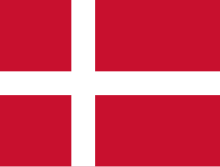| Denmark at the 2015 Summer Universiade | |
|---|---|
 | |
| IOC code | DEN |
| NOC | National Olympic Committee and Sports Confederation of Denmark |
| Website | http://www.dif.dk/en |
| in Gwangju, South Korea 3 – 14 July 2015 | |
| Competitors | 22 in 5 sports |
| Medals Ranked 62nd |
|
| Summer Universiade appearances | |
Denmark participated at the 2015 Summer Universiade in Gwangju, South Korea.